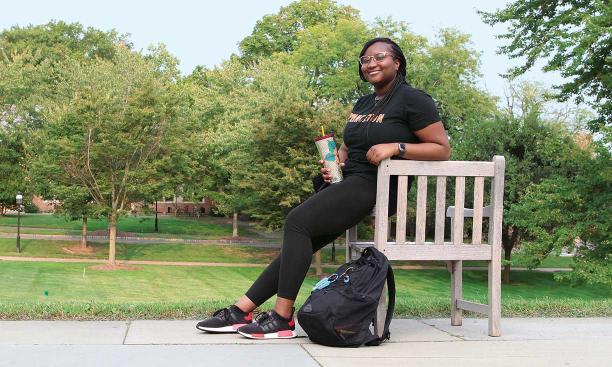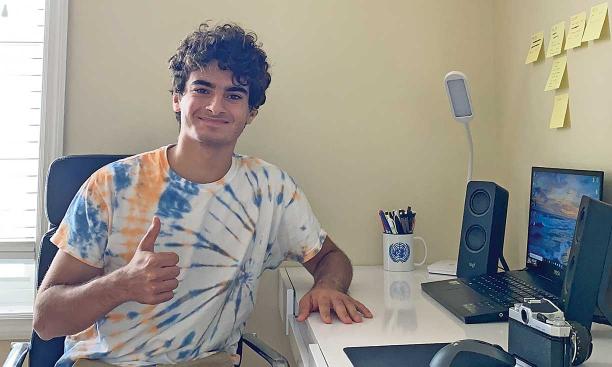
Obtaining a student visa was a nerve-wracking process for Weilyn Chong ’24, but she was finally able to secure it about a week before she was to travel to Princeton in August. Packed and ready to go, Chong received the news — the day before her flight — that the University decided most students could not return to campus because of the ongoing spread of COVID-19.
As a result, Chong instead began her Princeton journey from her family’s apartment in Hong Kong.
“I’m kind of glad now, looking at other universities that did open,” Chong said. While she realized that it was safer for students to stay at home, she admitted she “was definitely bummed out for a while.”
The transition has been challenging, as Chong must attend classes between 9 p.m. and midnight. She’s working on figuring out the best structure for her days so she can find balance and proper rest. Chong also tuned in to Opening Exercises, which ran into the wee hours of the morning.
In his virtual welcome address, President Eisgruber ’83 told the class he looked forward to the day they could finally meet in person. “Creating this virtual community won’t be easy,” he said. “It’s not something that any incoming freshmen class has ever had to do before. It’s not something for which there is a standard playbook. But I am confident that we can do it together.”
The University held advising and residential-college meetings online. There was a virtual Step Sing, featuring videos from alumni, including the “grandparent” Class of ’74 (see bit.ly/step-sing), and a discussion with Pre-read author Jill Lepore about her book This America: The Case for the Nation, in which students asked her questions directly.
“I appreciate that people are still putting in the effort to kind of have us have an experience akin to what we would have had on campus,” said Joshua Arce ’24, from Salem, Oregon. “We’re still able to get some experience, even if it’s virtually.”
The Class of 2024 includes 1,155 students — nearly 200 fewer than last year, due to an increase in deferrals. There are slightly more men (50.6 percent) than women (49.4 percent). International students come from 48 countries and make up almost 12 percent of the class. More than half of U.S. students identify as minority students. More than 15 percent are first-generation college students, and 11 percent are children of alumni.
While most first-year students began the semester from home, some relocated to establish connections. Bashar Eid ’24 from Des Moines, Iowa, decided to move to Jersey City. He found his three other roommates, who are also Princeton freshmen, through a student group chat. University financial aid helped cover the cost of his new apartment, he said.
“The decision to move out just came from me wanting to get out of the house and meet new people,” Eid said. He’s been able to connect with other students in the area and said he is also glad to be somewhat closer to campus, though he hasn’t visited Princeton.
Dusu Sidibay ’24, from Boston, moved to campus because she lacked an adequate study space at home and was worried about distractions. She’s also been able to make connections with other students on campus, meeting people for walks or studying near friends in Studio ’34, the self-service café in the lower level of 1967 Hall at Butler College. While there’s little else to do, she said, it’s better than nothing.

About 215 undergraduates received permission to return to campus because they were unable to learn at home or find suitable alternative housing. Among them is PAW intern Arika Harrison ’21, from Salem, Oregon, who said that with no in-person events and very few people, “it’s not like it’s fun here.” Harrison returned because it was a better alternative to study compared to being at home, she said.
The 67 undergraduate and 178 graduate students who returned from the states on New Jersey’s travel-advisory list had to quarantine in their rooms for 14 days. All students on campus who are not showing symptoms have to be tested for COVID-19 two times a week, by providing a saliva sample. Through Sept. 6, one asymptomatic graduate student tested positive, according to the University.
Apart from the social scene, anxiety about remote learning lingered as well. Sidibay said her biggest concern was “Zoom fatigue.” “Not only do we have class online, but then extracurriculars, [and] that’s how you get away from classes,” she said. Adjusting to the workload of college has also been challenging, she added.
Rauniyar Sriyans ’24, a student in Nepal, said it has been difficult to get school supplies. “I haven’t even received my Pre-read yet,” Sriyans said. “How do I expect to receive my textbooks?”
While the experience of virtual learning at Princeton is new for the Class of 2024, this is the second time for everyone else. Kevin Martinez ’23 said he has struggled over the past few months. His uncle died of COVID.
“I was dealing with my own problems,” Martinez said. “Then I also needed to be a shoulder for [my mom] to cry on, which is hard, but I mean we got through it.”
Martinez returned to Princeton for the fall and is hopeful the semester may go better now that his environment has changed. But he’s still concerned for others who may struggle like he did. “I don’t think anybody who doesn’t adjust well should really be held super accountable for their failings and shortcomings,” he said. “It is really just a weird situation.”
